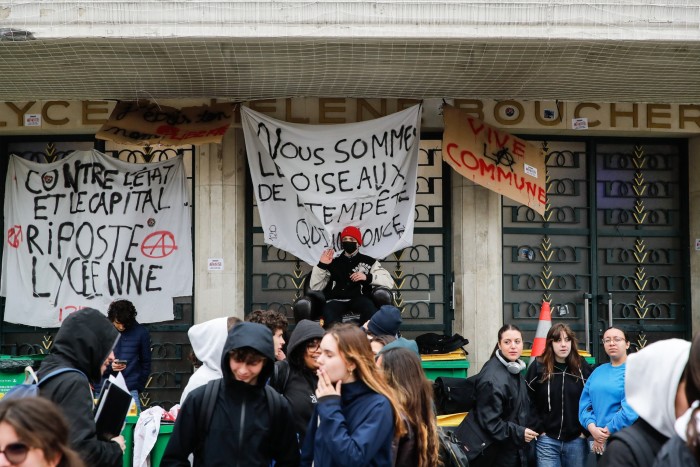Small crowds across France took part in the tenth nationwide demonstration by unions against President Emmanuel Macron’s unpopular plan to raise the retirement age.
The CGT workers’ union estimated that 450,000 people turned out in Paris, compared with 800,000 in the last union-led demonstration on Thursday. Police figures say 740,000 people across the country, compared with more than a million people last week.
The low turnout is a boost for Macron’s government, which has rejected union efforts to mediate to ease the crisis and has vowed to remain committed to finalizing the reform by mid-April once it is reviewed by the Constitutional Court. Unions have called for a nationwide strike on April 6.
Chaotic scenes at a union-led demonstration on Thursday may have prevented some protesters from attending marches, and radical activists lit 900 fires in Paris alone and clashed with police. Some 457 arrests were made, prompting criticism from the EU’s top human rights watchdog.
Although opposed by nearly two-thirds of the French public, Macron has touted his reform credentials and his second-term agenda of raising the minimum retirement age from 62 to 64. His government this month used Article 49.3 of the constitution to dismiss lawmakers. The draft law, without a referendum, sparks a wave of public anger.
The crowd last Thursday was the largest since the protests began and spontaneous night-time protests have broken out in several towns and cities, making it difficult for labor unions to control the movement.
Lorelia Fréjo, a 23-year-old member of Collectif Le Poing Levé, a Marxist revolutionary student group, said despite police repression, young people tried to express their discontent outside official marches organized by unions.
“We’ve been told by the government that it’s not enough to have millions of people on the streets, it’s useless,” he said at the Place de la République, where Tuesday’s march began in Paris. “So we must intensify our action … to protest outside the prescribed calendars.
On Tuesday, some protesters set fire to uncollected trash in Paris and small groups clashed with police in Lyon and Bordeaux. But overall the situation was calmer than it was on Thursday. The Home Ministry has deployed 13,000 police officers across the country, up from 12,000 last time.
Frejo said it was frightening to see police clashing with protesters and making arrests, but expressed his determination to carry on. “The government wants to scare us, but we’re not going to stop.”
Student activists closed nine university campuses in Paris and at least 10 universities in cities including Toulouse and Nice on Tuesday, according to the UNEF union. Outside Dolbiac University in Paris, students piled electric scooters and waste bins to block entrances and chanted anti-pension reform slogans on the walls.
Macron ruled out dragging out the reform, arguing that it was necessary to ensure the pension system’s viability in an aging population. The law, which requires the approval of the Constitutional Court before it can be enacted, raises the retirement age by two years and requires 43 years of work to qualify for a full pension.

The government is concerned that the presence of young people in demonstrations alongside radical activists, which the government refers to as “extreme left”, increases the risk of injuries or deaths. Two activists were seriously injured in a clash with the police during an unrelated protest over an agricultural reservoir on Saturday.
Several human rights groups have expressed alarm over French police tactics. Council of Europe Commissioner for Human Rights Dunja Mijadovic said on Friday that conditions surrounding the protests were becoming “worrisome” and warned against police using “excessive force” or taking away people’s right to protest.
Officials at the Elysee Palace are reaching out to unions to find ways to ease the crisis. But the government rejected their proposal to put the reform on “pause” to allow peace to return to the streets.
On Tuesday, Laurent Berger, head of the moderate CFDT union, proposed the creation of a “mediation” process led by neutral parties.
“We should take a month or two to ask a few people to mediate,” he said on France Inter radio, “a gesture to bring back peace.”
However, government spokesman Olivier Véran dismissed the idea. “When we speak directly there is no need for mediation,” he said.

“Total coffee junkie. Tv ninja. Unapologetic problem solver. Beer expert.”
